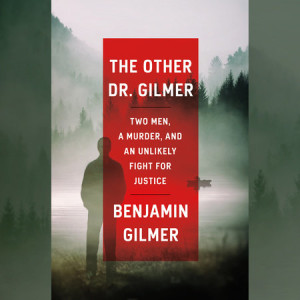
26K
Downloads
304
Episodes
The Chills at Will Podcast is a celebration of the visceral beauty of literature. This beauty will be examined through close reads of phrases and lines and passages from fiction and nonfiction that thrills the reader, so much so that he wants to read again and again to replicate that thrill. Each episode will focus on a different theme, such as "The Power of Flashback," "Understatement," "Cats in the Cradle," and "Chills at Will: Origin Story."
Episodes

Thursday Mar 03, 2022
Thursday Mar 03, 2022
Episode 107 Notes and Links to Dr. Benjamin Gilmer’s Work
On this episode of The Chills at Will Podcast, Pete welcomes Dr. Benjamin Gilmer, and the two discuss, among other topics, Dr.’s early days at the rural Mountain Area Health Education Center, his directly following Dr. Vince Gilmer, and the ways in which Dr. Benjamin Gilmer got to know Dr. Vince’s story and generous medical work, and then Dr. Vince himself. The conversation includes discussion of the newly-released book, the neurological disease that Dr. Vince discovered he had, and the specific implications for his case and society’s understanding and treatment of mental health’s connection to incarceration.
Dr. Benjamin Gilmer is a family physician and Associate Professor at the University of North Carolina School of Medicine and Mountain Area Health Education Center’s (MAHEC) Family Medicine Residency Program. He is an international Albert Schweitzer Fellow and attended Davidson College followed by medical studies at the Sorbonne in Paris, France and East Carolina University. As the Medical Director for MAHEC’s Rural Health Initiative and Rural Fellowship, he is passionate about advocating for global and rural health disparities. He has worked extensively in Central and South America and West Africa. Benjamin is committed to advancing medical education, point of care ultrasound, interprofessional collaboration and inspiring students to pursue rural health.
His advocacy work currently focuses on bringing media attention to the social injustice of mass incarceration. His book, The Other Dr. Gilmer (Ballantine/Penguin Random House) and feature film project (Concordia Films) both highlight the injustice of mass incarceration of people with mental illness. The book is out as of March 1! Both projects are based on a 2013 This American Life podcast (Dr. Gilmer and Mr. Hyde), a collaboration between Benjamin and Sarah Koenig (“Serial”) which has had more than 10 million listeners. A former neurobiologist turned rural family doctor, Dr. Gilmer has lectured across the country about medical ethics, global and rural health, bias in medicine, and the intersection of medicine and social justice. He lives with his wife, Deirdre, two children, Kai and Luya, and their dog Prince Peanut Butter in Asheville, North Carolina.
Penguin Random House Page for The Other Dr. Gilmer
Hollywood Reporter Article about Movie Adaption of The Other Dr. Gilmer
The legendary This American Life episode, “Dr. Gilmer and Mr. Hyde” (10+ million downloads to date!)
At about 3:10, Dr. Gilmer responds to Pete’s questions about his parents’ and family influences on intellectual curiosity
At about 4:30, Pete asks Dr. Gilmer about early reading experiences and childhood exploration
At about 6:20, Dr. Gilmer describes the outsized impact of Dr. Albert Schweitzer and speaks of some of his own work in Gabon; Pete and Dr. Guilmer also speak of the late, great Dr. Paul Farmer
At about 8:50, Pete and Dr. Gilmer talk about corporatization/for-profit medicine, and Dr. Gilmer talks about service-oriented medicine as experienced in Gabon; he also discusses a symbolic anecdote of the “throne” being shared by a town leader in Gabon
At about 13:20, Dr. Benjamin talks about his time-his “baptism in medicine”-at Broughton Hospital as an instructive and inspiring time
At about 15:25, Pete and Dr. Benjamin discuss the ACE testing and tests for gauging sociopathy
At about 16:45, Pete references Ira Glass’ understated, stunning beginning of the legendary This American Life episode, “Dr. Gilmer and Mr. Hyde”
At about 17:30, Dr. Gilmer talks about starting work at the clinic (MAHEC Family Health Center at Cane Creek) as an “outsider” and almost not being hired due to the fact that his name was the same as his imprisoned predecessor
At about 19:25, Pete and Dr. Gilmer reference a humorous and inauspicious anecdote about suspicions of modern medicine that is told in the book
At about 21:15, Dr. Gilmer gives some background on Fletcher, NC, where the clinic is located
At about 22:40, Dr. Gilmer discusses the clinic’s patients’ views and stories of Dr. Vince Gilmer’s generosity and kindness, including an allegorical incident involving caring for mice, and how these stories being in opposition to the crimes that Dr. Vince committed, and how Dr. Benjamin was inspired “to look further” into
At about 25:10, Dr. Benjamin recounts a story of a patient shaking him up and making him “paranoid” about Dr. Vince seeing him as a “usurper”
At about 28:55, Dr. Benjamin talks about Tommy, a recipient of generosity from Dr. Vince, and how Dr. Vince’s traumatic childhood and evolving disease led to “effusive generosity”
At about 31:00, Dr. Benjamin highlights Woody Guthrie’s experience with a similar disease
At about 32:40, Dr. Benjamin and Pete discuss the parts of the book where the doctor had done research into the specifics of Dr. Vince’s crime, and the delusion that led to baffling and strange actions in the immediate aftermath of the murder; Dr. Benjamin also cites the brain “as a character” in the book and how Dr. Vince’s background of abuse served as a trigger
At about 35:40, Dr. Benjamin talks about sensitizing readers/listeners to the fallibility of the brain and how we all share mental health imbalances/struggles
At about 38:00, Dr. Benjamin talks about the “coin toss” of brian health and his connection to Dr. Vince
At about 40:00, the two discuss the precedent in the legal world for SSRI-related crimes, and Dr. Benjamin talks about his initial “no” to inquiries from Sarah Koenig re: doing an episode for “This American Life”
At about 42:20, Dr. Benjamin drops some “WOAH!” information about the connection between his NPR episode and the legendary “Serial”
At about 42:50, the two discuss some early interviews that Dr. Benjamin and Sarah Koenig did with local residents and law enforcement after Dr. Vince’s crime
At about 43:50, Dr. Benjamin talks about “preconceptions” and their impact in the Dr. Vince case and in society in general; he also talks about how he hopes the book allows more room for
At about 45:25, Dr. Benjamin describes his first meeting with Dr. Vince and how his own doubts and biases came into play
At about 49:00, Dr. Benjamin recounts the “farcical” nature of Dr. Vince’s court case
At about 51:20, Dr. Benjamin talks about Dr. Vince’s court case as representative of problems with the country’s carceral, legal, and medical systems
At about 52:40, Pete cites an example from the This American Life episode of questions asked by Dr. Vince backfiring spectacularly at trial
At about 53:20, the two discuss intergenerational abuse and its cycles, particularly with regards to sexual and physical violence done to Dr. Vince and his sister
At about 54:00, Pete and Dr. Benjamin muse on culpability with regards to Dalton Gilmer, Dr. Vince’s father
At about 56:45, Dr. Benjamin reflects on ideas of “reverence for life,” a philosophy of looking at victims and victimizers
At about 58:50, Dr. Benjamin and Pete give some staggering statistics about the connections between prisoners and mental health
At about 59:45, Dr. Benjamin highlights the heroic contributions of Dr. Steve and Dr. Colin Angliker in small and big ways
At about 1:01:20, Dr. Benjamin answers Pete’s question about what brought a sense of calm to Dr. Vince, even when receiving word of his degenerative health condition
At about 1:03:10, Dr. Benjamin talks about Dr. Vince’s disease as not “the whole picture,” but just part of a larger mental health puzzle
At about 1:03:55, Pete and Dr. talk about the Gilmer family expanding to include Dr. Vince
At about 1:04:40, Dr. Benjamin shares his hopes about what the book can do, has done, and will do
At about 1:07:20, Dr. Benjamin talks about reframing the ways in which we treat prisoners
At about 1:08:25, Pete discusses the changes that have come through reading this book
At about 1:09:20, Dr. Benjamin responds to Pete’s question about how to get involved in similar advocacy groups, and he talks about ways in which people can help in big and small ways and in learning about incredible organizations like Bryan Stevenson’s Equal Justice Initiative, The Innocence Project, Marshall’s Project
At about 1:11:20, Dr. Benjamin and Pete talk about where to buy the book and the early roll-out of the book; Malaprop’s in Asheville is shouted out as a great bookstore to buy The Other Dr. Gilmer
At about 1:11:50, Dr. Benjamin talks about the collaboration with Jennifer Fox and Concordia with Dr. writing the book and Jennifer writing the upcoming film
You can now subscribe to the podcast on Apple Podcasts, and leave me a five-star review. You can also ask for the podcast by name using Alexa, and find the pod on Stitcher, Spotify, and on Amazon Music. Follow me on IG, where I’m @chillsatwillpodcast, or on Twitter, where I’m @chillsatwillpo1. You can watch other episodes on YouTube-watch and subscribe to The Chills at Will Podcast Channel. Please subscribe to both my YouTube Channel and my podcast while you’re checking out this episode.
This is a passion project of mine, a DIY operation, and I’d love for your help in promoting what I’m convinced is a unique and spirited look at an often-ignored art form.
The intro song for The Chills at Will Podcast is “Wind Down” (Instrumental Version), and the other song played on this episode was “Hoops” (Instrumental)” by Matt Weidauer, and both songs are used through ArchesAudio.com.
Please tune in for Episode 108 with Navdeep Singh Dhillon, the author of Sunny G’s Series of Rash Decisions, an adjunct professor of creative writing and English at Borough of Manhattan Community College, and co-founder of IshqInABackpack (Ish-k), a narrative travel blog. The episode will air on March 8.

No comments yet. Be the first to say something!